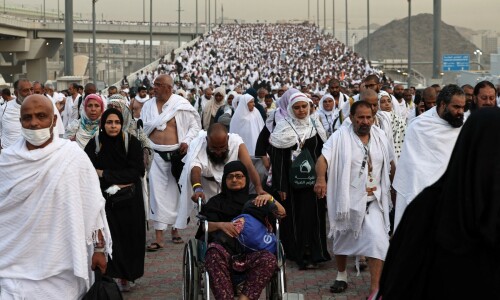PESHAWAR, March 8: Experts have asked the people to use bed nets and spray stagnant water pools in their neighbourhoods before the beginning of the breeding season of mosquitoes to avoid malaria.
"The people can be protected against malaria through insecticides and use of bed nets," said an official associated with malaria control programme. Citing the WHO's guidelines, he suggested that insecticide spray should be conducted in the selected areas, because it had been declared as poisonous and pollutant Environmental Pollution Agency (EPA).
The blanket anti-mosquito spray had been proving ineffective, because the mosquitoes develop resistance against it, said a doctor at the directorate of health. The government, he added, was yet to conduct spray in the high-risk districts owing to lack of funds and infrastructure.
According to him, it was the responsibility of the government to carry out fumigation exercise and save the people from being inflicted with malaria, but it has yet to devise a strategy to cope with the situation when the breeding season is just round the corner.
Education of the people is of significance, because the government has not established laboratories and provided facilities of early diagnosis and prompt treatment to the affected people in the areas, such as Swabi, Mardan, Malakand, Lakki Marwat, Dera Ismail Khan, etc.
An official at the provincial malaria programme said that pumps had been provided by the USAID 35 years ago, which were not functional. He said funds were made available by the government to repair the pumps and spray in the high-risk districts.
The official said that they had sent proposals to the WHO for providing the insecticide treated bed nets to people in the high-risk districts on subsidised rates.
According to him, the WHO would provide assistance under its Global Fund for Aids, TB and Malaria (GFATM) programme to the NWFP, which would be used for control of the disease.
He suggested that the people should sprinkle kerosene oil on the garbage centres and pools of stagnant water in their localities to eliminate the breeding sites of mosquitoes.
The official was of the view that strategies would be adopted in the high-risk districts to diagnose the patients in 24 hours and give them prompt treatment. In case of relapse, the patients would be provided with another dose of medicine and if the problem persisted they would be hospitalised, he said.
A WHO's official said that malaria was the third largest killer in the third world countries and children and pregnant women were the worst sufferers. He said every district needed laboratory and separate staff to deal with malaria cases.












































Dear visitor, the comments section is undergoing an overhaul and will return soon.